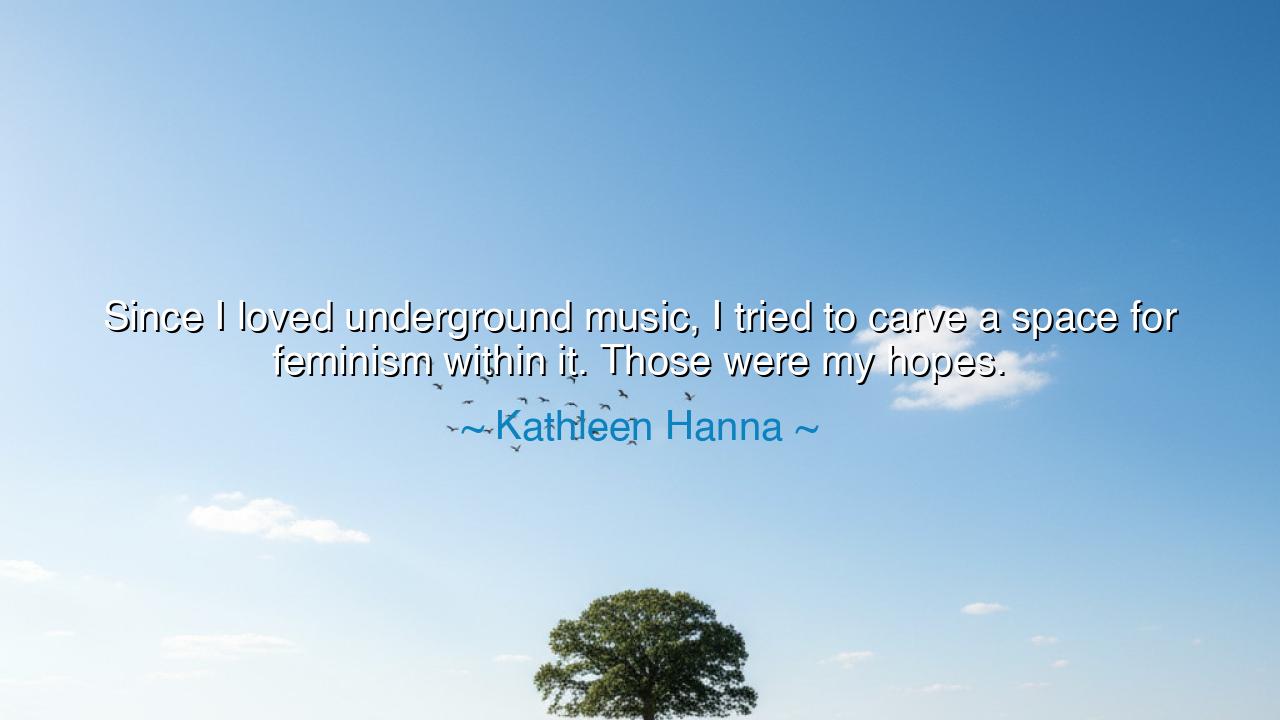
Since I loved underground music, I tried to carve a space for
Since I loved underground music, I tried to carve a space for feminism within it. Those were my hopes.






Hear now the words of Kathleen Hanna, warrior of sound and spirit, who declared: “Since I loved underground music, I tried to carve a space for feminism within it. Those were my hopes.” These words may seem small, spoken like a remembrance of youth, yet within them lies the timeless battle of creation, resistance, and vision. For when the world denies you space, when the halls of power are guarded by those who mock your voice, then the true labor of the soul is to carve a space where none was given.
The ancients knew this struggle. Every movement of freedom, every whisper of justice, began as something hidden, small, and fragile. So too was underground music, a place where the rejected, the unheard, and the defiant raised their songs. It was not polished nor praised; it was raw, jagged, and alive. Into this storm of sound Hanna brought the flame of feminism, seeking to join the cry of rebellion with the cry of women, to unite rhythm with resistance, and melody with meaning. Her hope was not merely for songs, but for a world reshaped.
Consider the tale of Rosa Parks. The bus was no stage, no grand theater, yet in that small seat she carved a space for justice. She did not shout nor rage, but her refusal to move was louder than any trumpet. Just as Parks reshaped a bus into a battlefield for dignity, Hanna sought to transform dingy basements, makeshift stages, and cassette tapes into sanctuaries for women’s voices. For beauty is not only in palaces; it is wherever courage plants its roots.
Hanna’s struggle was also against invisibility. For in the realms of punk and underground music, where rebellion was praised, the voices of women were often drowned beneath the roar of men. To bring feminism there was to challenge not only the world outside, but the very circle of rebellion itself. It was to say: freedom that excludes half of humanity is no freedom at all. Just as Joan of Arc raised her sword in a world that denied her, Hanna raised her microphone and sang into the storm, declaring that women, too, must be heard.
And this is the heart of the teaching: love alone is not enough. Hanna loved the music, yes—but love without action remains a dream unborn. So she carved, struggled, and shouted until space was made. From her hope rose the Riot Grrrl movement, a chorus of women unafraid to mix rage with melody, tenderness with defiance. Out of basements and zines came a wave that would not be silenced. This is the power of hope joined with action: the creation of new worlds where none existed before.
So let us learn: when you love something, do not love it passively. Do not stand aside when it is unjust, nor bow when it excludes. If you love art, carve a space for truth within it. If you love knowledge, carve a space for justice within it. If you love your people, carve a space for their dignity within the structures that deny them. To love is to shape, to chisel, to fight until your love becomes flesh in the world.
The lesson is this: you are not merely a guest in the world—you are a builder of it. Where you find silence, raise a voice. Where you find exclusion, open a door. Where you find despair, plant hope. Like Hanna, take what you love and reshape it so that it does not only serve the strong, but lifts the weak. Your task is not only to inherit the world, but to carve new chambers within it, so others may dwell in freedom.
So remember: one voice may sound small, one act may seem hidden, but the underground is where fire begins. The torch you raise in shadows may one day blaze across the earth. Thus, when you find yourself loving, let that love compel you to carve, to fight, to create. And let your hopes—though fragile as breath—become the chisel that reshapes the stone of the world.






AAdministratorAdministrator
Welcome, honored guests. Please leave a comment, we will respond soon